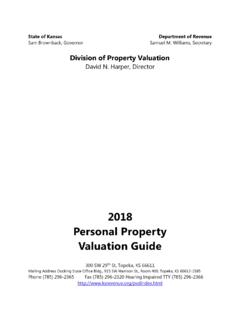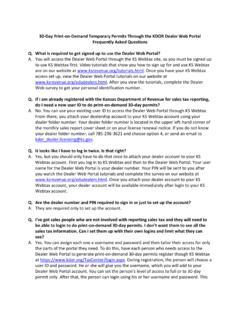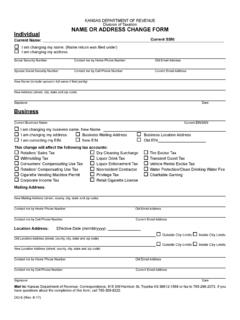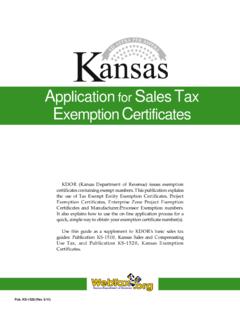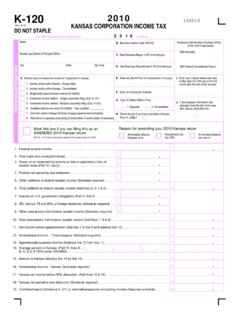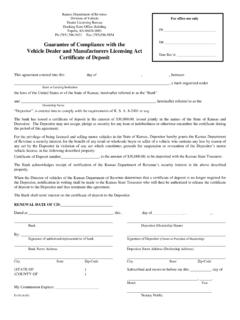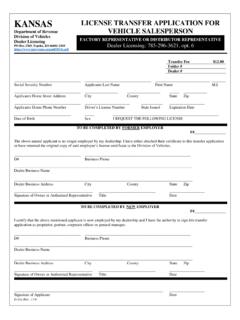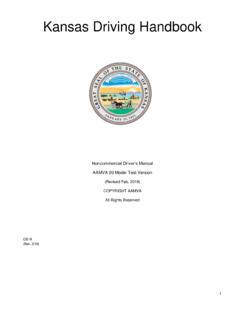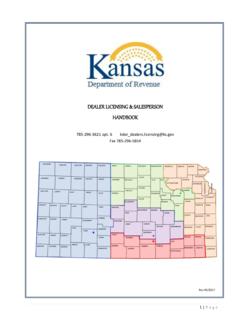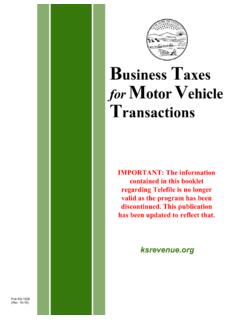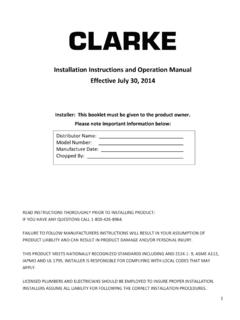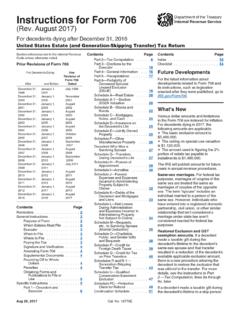Transcription of Individual Income Tax - ksrevenue.org
1 2014 Individual Income Tax For a fast refund, file electronically! See back cover for details. What s In This Book General Information .. 3 K-40 Instructions .. 6 Form K-40 .. 11 Schedule S .. 13 Schedule K-210 .. 15 Schedule S Instructions .. 17 Tax Table .. 20 Tax Computation Worksheet .. 27 Electronic Options .. 28 Tax Assistance .. 28 What s New Income TAX RATES. The Kansas Income tax rates have again been reduced. For tax year 2014 , the bottom and top brackets are and respectively. The tax rates are scheduled to drop through tax year 2018. SELF-EMPLOYMENT TAX MODIFICATION. Effective for tax years beginning after December 31, 2012, certaintaxpayers are not required to add back their deduction for self-employment taxes. See instructions for line A8 of Schedule S and NOTICE 14-02.
2 This modification may be claimed for tax year 2013 by filing an amended Form K-40. MODIFICATION FOR NET GAIN FROM SALE OF CERTAIN LIVESTOCK. Effective for tax years beginning after December 31, 2012, net gains from the qualified sale of certain livestock held for draft, breeding, or sporting purposes may be subtracted from federal adjusted gross Income . See instructions for line A22 of Schedule S and NOTICE 14-04. This deduction may be claimed for tax year 2013 by filing an amended Form K-40 with supporting documentation. EXPENSES RELATED TO HUMAN ORGANDONATION. Effective for tax years beginning after December 31, 2013, a subtraction modification (line A26 of Schedule S) may be taken for human organ donor expenses. Qualified expenses are summarized in NOTICE 14-03. ITEMIZED DEDUCTIONS. Gambling losses can no longer be claimed as an itemized deduction.
3 In addition, Kansas itemized deductions for tax year 2014 are reduced by 35% (except for charitable contributions, which is fully retained). To compute your Kansas itemized deductions, complete Part C of Schedule S. DISABLED ACCESS CREDIT (K-37). This tax credit was reinstated for tax year 2013 and all tax years thereafter for Individual filers. Information about how to claim this tax credit for tax year 2013 can be found in NOTICE 14-06. ADOPTION CREDIT (K-47). This tax credit was reinstated for tax year 2014 and all tax years thereafter. See NOTICE 14-05 for additional information. RURAL OPPORTUNITY ZONE (ROZ) CREDIT. Four additional counties have been added into the ROZ program (see NOTICE 14-07 for a complete list of eligible counties). This program offers individuals who relocate from outside Kansas to a ROZ county a tax credit.
4 To claim this tax credit you must file your return electronically see page 28. If you purchased goods online or through catalogs, newspapers, TV ads, etc. and did not pay sales tax, then you likely owe Kansas Compensating Use Tax What is Compensating Use Tax? Since 1937 Kansas has imposed acompensating use tax on goods purchased from outside Kansas and used, stored or consumed in Kansas. Its purpose is to protect Kansas retailers from unfair competition from out-of-state retailers who sell goods tax-free by applying a tax on these items equal to the Kansas rate. It also helps to assure fairness to Kansans who purchase the same items in Kansas and pay Kansas sales tax. Individuals and businesses buying items from retailers in other states may be subject to Kansas compensating use tax on those purchases. The use tax applies to the total cost of the merchandise, including postage, shipping, handling or transportation charges.
5 The use tax rate is the same as the combined state and local sales tax rate in effect where the buyer takes delivery in Kansas. For individuals, it is usually the home. For businesses, it is where the items are used (office, shop, etc). Do I owe this tax? Kansans that buy goods in other states or throughcatalogs, internet, mail-order companies, or from TV, magazine and newspaper ads must pay Kansas use tax on the purchases if the goods are used, stored or consumed in Kansas and the seller does not charge a sales tax rate equal to or greater than the Kansas retailers sales tax rate in effect where the item is delivered or first used. EXAMPLE: An Anytown, KS resident orders a computer from a company in New York over its web site. Total cost for the computer is $2,000 plus $10 shipping. The Anytown resident will owe Kansas use tax of (current Anytown rate) on the total charge of $2,010.
6 ($2,010 X = $ ) How do I pay the Compensating Use Tax? To pay Kansas use taxon your untaxed out-of-state purchases made during calendar year 2014 , refer to the instructions for line 19 of Form K-40 on page 8. You may either use the chart, or compute the tax due by applying the state and local sales tax rate in effect for your address to the total purchases subject to the tax. Don t know your sales tax rate? Go to to look up the rate for your location. If you have any questions about use tax or about your responsibilities for reporting and paying this tax as an Individual Kansas consumer, please contact our Taxpayer Assistance Center (see page 28). PHOTO BY Kansas Department of Wildlife, Parks and Tourism Distinguished by their large head, horns, and shoulder hump, the AMERICAN BISON, (Bison Bison), is an icon of the Great Plains and in 1955 became the state mammal of Kansas.
7 Considered the largest North American land mammal, bison can weigh up to one (1) ton, have thick brown fur and both adult male and female have curved horns. Bison calves are born an orange/rust color that changes as they grow older. Despite their large size, bison are quick and agile, running up to forty (40) miles per hour and can jump higher than six (6) feet. KDWPT has three publicly owned bison herds for viewing these majestic animals: Sandsage Bison Range (Garden City), Maxwell Wildlife Refuge (Canton), and Mined Land Wildlife Area #1 (Pittsburg). Page 2 Page 3 GENERAL INFORMATION If any due date falls on a Saturday, Sunday, or legal holiday, substitute the next regular workday. Who Must File a Return You must file a Kansas Individual Income tax return to receive any refund of taxes withheld, regardless of the amount of total Income .
8 Kansas law provides that if a husband or wife is a resident of Kansas while the other is a nonresident of Kansas, and file a Married Filing Joint federal return, they must file a Married Filing Joint Kansas return and file as nonresidents of the state of Kansas. KANSAS RESIDENTS. A Kansas resident for Income tax purposes is anyone who lives in Kansas, regardless of where they are employed. An Individual who is away from Kansas for a period of time and has intentions of returning to Kansas is a resident. If you were a Kansas resident for the entire year, you must file a Kansas Individual Income tax return if: 1) you are required to file a federal Income tax return; or, 2) your Kansas adjusted gross Income is more than the total of your Kansas standard deduction and exemption allowance.
9 The minimum filing requirements are shown in the following table. If you are not required to file a federal return, you may use this table to determine if you are required to file a Kansas return. For example, if your filing status is single, and you are over 65, you need not file a Kansas return unless your gross Income is over $6,100. A married couple filing jointly would not be required to file a Kansas return unless their gross Income is over $12,000. A Kansas resident must file if he or she is: And gross Income is at least: SINGLEU nder 65 $ 5,250 65 or older or blind $ 6,100 65 or older and blind $ 6,950 MARRIEDFILING JOINT Under 65 (both spouses) $12,000 65 or older or blind (one spouse) $12,700 65 or older or blind (both spouses) $13,400 65 or older and blind (one spouse) $13,400 65 or older or blind (one spouse) and 65 or older and blind (other spouse) $14,100 65 or older and blind (both spouses) $14,800 HEAD OF HOUSEHOLDU nder 65 $10,000 65 or older or blind $10,850 65 or older and blind $1 1,700 MARRIEDFILING SEPARATE Under 65 $ 6,000 65 or older or blind $ 6,700 65 or older and blind $ 7,400 MINOR DEPENDENTS.
10 A minor child claimed on another person s return can claim a standard deduction of $500 or the amount of their earned Income (wages) up to $3,000, whichever is greater. Unearned Income (such as interest and dividends) over $500 is taxable to Kansas and a Kansas return must be filed. If the taxable Income (line 7, Form K-40) is zero, a return is not required. However, you must file a Kansas Individual Income tax return to receive any refund of taxes withheld, regardless of the amount of total Income . NONRESIDENTS. If you are not a resident of Kansas but received Income from Kansas sources, you must file a Kansas return regardless of the amount of Income received from Kansas sources (see Kansas Source Income on page 19). If your employer withheld Kansas taxes from your wages in error, you must also file a Kansas return in order to receive a refund, even though you had no Income from Kansas sources.
